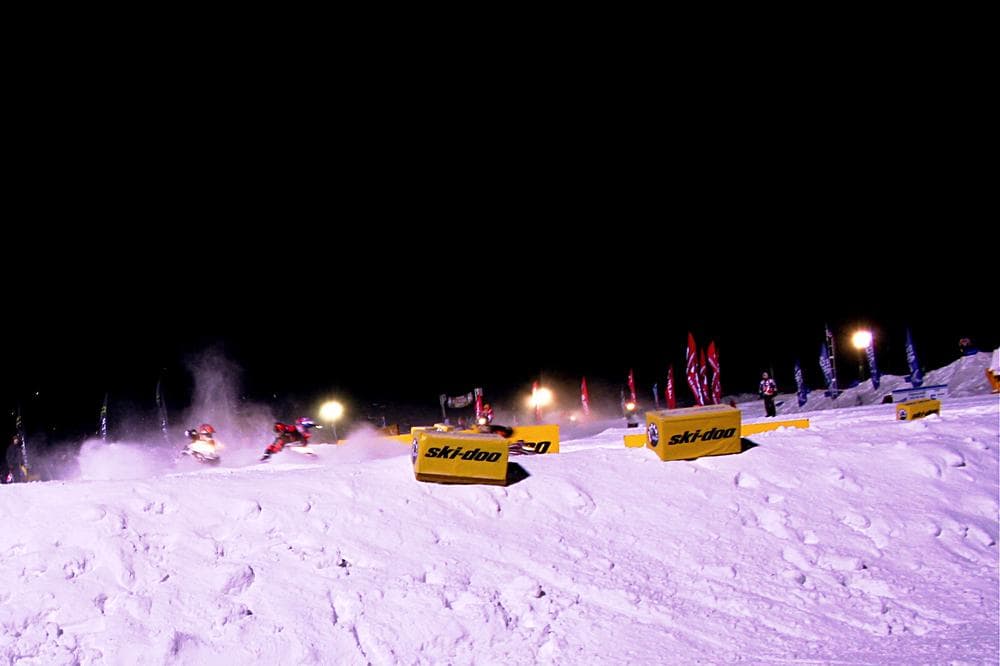Advertisement
Feature
The Future Of Freestyle Snowmobiling

In January of 2012, things were going well in the world of freestyle snowmobiling. Sponsors continued to pump record money into the sport. Riders were actually able to make a living doing their trick jumps. And at ESPN’s annual Winter X Games — considered the Super Bowl of freestyle snowmobiling — rider Heath Frisby had just made history with a new trick — a front flip.
But that euphoria dissipated three weeks ago when 25-year-old Caleb Moore rode his snowmobile up a ramp, flipped in the air…and then crashed. The snowmobile landed on him. Still, Moore got up and walked away. But complications later developed, and he succumbed to a head injury.
“He made an error with a flip trick and under rotated a little bit,” Frisby said. “We’ve all done that. It’s just a matter of the way it all played out.”
He made an error with a flip trick and under rotated a little bit. We've all done that. It's just a matter of the way it all played out.
Heath Frisby
Frisby is 28-year-old rider from Idaho who’s been jumping snowmobiles since he was 14. And right now, he’s defending his sport. As news about Moore’s death spread, many outside freestyle snowmobiling began to question its safety. Frisby takes offense.
“It’s imminent that somebody riding bulls professionally would die doing that,” Frisby said. “It’s imminent that somebody racing is eventually going to get landed on and killed, and has been killed. It just wasn’t live on television. What we’re doing is dangerous. There’s no doubt about it.”
Moore’s death has prompted ESPN to conduct a review of freestyle snowmobiling. This week, the network announced it was canceling a freestyle demonstration at a Winter X Games event in France next month. Scott Guglielmino, ESPN’s head of programming, recently discussed safety on the network’s show “Outside the Lines.”
“We’re equally — not equally, but we’re all responsible for it,” Guglielmino said. “The athletes are willing participants, and again, these athletes train year-round. They’re world class. They know what they’re doing. They don’t just show up to the X Games. And also we are a partner in that. We design these courses and we certainly put it on air. So I think we collectively have a responsibility to make sure we’re mitigating as much risk as possible.”
Advertisement

Among those watching the situation is Tim Mutrie. He’s a Colorado writer who has covered the sport for ESPN and the New York Times. He describes those who jump snowmobiles as “strange and unusual”.
“I mean that complementary because…I’ve always been kinda blown with the passion, and the devotion and sort of love these guys have for the sport,” Mutrie said.
He compares freestyle snowmobiling right now to the early days of stock car racing. The sport is relatively new, and made up of young daredevils who push the limits of safety without a sanctioning body to keep watch. Mutrie wonders if the addition of such an organization would make events like ESPN’s Winter X Games safer.
“The TV network is basically the owner/operator/promoter of a competition,” Mutrie said. “And you have all these athletes who all they want to do is hit that ramp and let it fly. Where in that formula is like, a third party?”
Snowmobile racing events, like one that took place last weekend in Michigan, are sanctioned. The International Series of Champions, or ISOC, organizes races each winter. The series had also planned two freestyle competitions, but cancelled them after Moore’s death.
“It just wasn’t the right time,” said Carl Schubitzke, president of the ISOC. “At a later time we’ll probably pursue it. Or maybe not.”

One of the fans attending last weekend’s race in Michigan was Jason Stuart. He says Moore’s death was a big loss for the sport, but that the tragedy doesn’t take away from his interest.
“It’s sad to see him go, but…the sport will carry on,” Stuart said. “They might need to make some changes, and we’ll understand that, and we’ll still watch it.”
Back at his home in Idaho, freestyle rider Heath Frisby laid out the medals he’s won at Winter X Games. Of them, a bronze from his first competition is his favorite because it signifies how far he and the sport had come. And he said despite the recent death and the scrutiny that’s gone with it, he’s optimistic about the future of freestyle snowmobiling.
“We’re all sticking together at this point as far as riders,” Frisby said. “Everybody’s pretty positive and just trying to push through it and continue on with what we started.”
With the recent cancellations, the competitive part of Frisby’s schedule is over for the season. He’ll now focus on exhibition events to continue raising the sport’s profile…and continue hoping there will be more competitions next winter.
This segment aired on February 16, 2013.